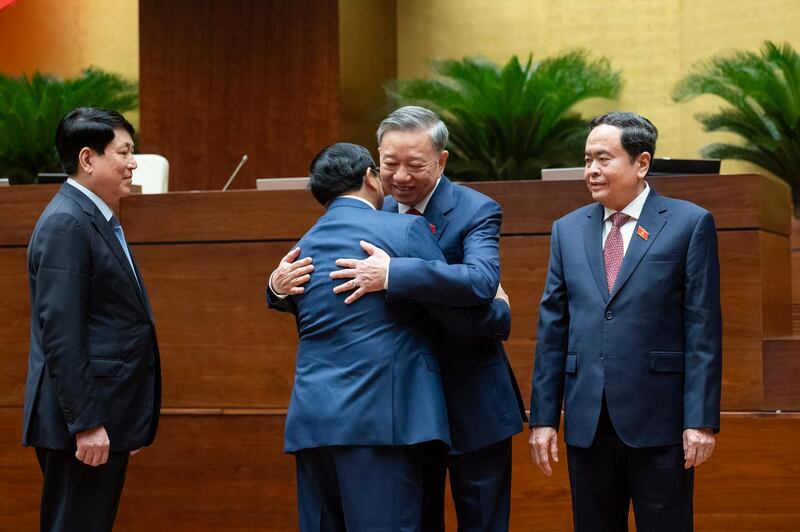Updated on Oct. 22, 2024 04:22 a.m. E.T.
Vietnam’s National Assembly elected four-star general and top Communist Party official Luong Cuong president on Monday at the beginning of a month-long session in Hanoi. He was the only candidate in the vote in the legislature, streamed live on the government’s YouTube channel.
Cuong, permanent member of the Communist Party of Vietnam Central Committee Secretariat, takes over from To Lam, who has held the post of president since May and became Communist Party general secretary in August.
Cuong has been in charge of the party’s daily operations since becoming the permanent member of its Secretariat in May when Truong Thi Mai resigned from the post after being accused of violating party regulations.
RELATED STORIES
[ No pause in Vietnam elite political jockeying for Nguyen Phu Trong's funeralOpens in new window ]
[ Vietnam lawmakers approve President Vo Van Thuong's resignationOpens in new window ]
[ Vietnam's President Nguyen Xuan Phuc ousted over corruption scandalsOpens in new window ]
Cuong, who was born in northern Vietnam’s Phu Tho province in 1957 and joined the army at the age of 18, became director of the army’s General Department of Politics in 2016. That same year, then-party general secretary and president, Nguyen Phu Trong, elevated Cuong to four-star general, the army’s highest rank.
Some analysts consider Cuong to be politically inexperienced but he has taken on a more prominent role since Lam became general secretary in August, following Trong’s death, fuelling speculation he would be chosen to take over the presidency from Lam.
On Oct. 11, during a four-day visit to China, Cuong met President Xi Jinping, Foreign Minister Wang Yi and Xi’s powerful chief of staff Cai Qi.
At 67, Cuong is the same age as Lam. An age limit of 65 for reelection to Vietnam’s Politburo should put both out of the running when the next National Congress selects members of the top decision-making body in 2026.
However, exceptions have been made, notably the decision to allow Trong to serve as general secretary until his death at the age of 80.

Another exception would need to be made regarding Cuong’s lack of political experience, according to Carl Thayer, emeritus professor at the University of New South Wales, Canberra. He pointed out that Politburo regulations require the president to have served as party secretary of a province, municipality or head of a central department in a government ministry. Cuong has only held military and party posts.
In spite of the fact that Cuong has not held such a political position, he still has three important strengths, according to Thayer.
“First, he is a specialist on ideology and a firm defender of Vietnam’s one-party state. Second, he has the support of the military and those elements of the party that wish to retain collective leadership under the four pillar structure. Third, he brings party seniority to the office of state president. Cuong has served three terms on the party Central Committee and will complete one full five-year term on the Politburo.”
The four pillar structure refers to the president, prime minister, general secretary and parliament chairperson. The system is intended to prevent one of them holding too much power, although the general secretary’s position is considered the most influential.
Vietnam’s presidency has been a revolving door in the past two years amid a crackdown on corruption, known as the Blazing Furnace, spearheaded by Nguyen Phu Trong during his time as general secretary.
Nguyen Xuan Phuc resigned as president in January 2023 to take responsibility for COVID-19 bribery scandals that happened on his watch.
In March this year, his successor, Vo Van Thuong, stepped down following a corruption scandal involving regional government officials.
Some political commentators speculated that Trong took advantage of the Blazing Furnace to consolidate power and protect his position.
Lawyer Dang Dinh Manh, a U.S.-based observer of Vietnam’s politics, suggested that Lam had to relinquish the presidency to promote power-sharing and balance within the party.
“Regardless of what happens, the people, who are the country’s rightful owners, remain marginalized, merely watching political changes as spectators,” said the lawyer, who was forced into exile after defending several activists. ”These changes could deeply affect their lives, including their values of freedom, democracy, and human rights.”
Lam, public security minister during Trong’s time as top leader, has vowed to continue the corruption crackdown.
On Monday, Lam told parliament they should, “focus on controlling power in law-making, tighten discipline, promote responsibility, especially the responsibility of leaders, and resolutely fight against negativity and group interests,” according to a government TV transcript of his National Assembly address.
As the current torch carrier for the Blazing Furnace campaign, Lam will be in as powerful a position as Trong was when it comes to protecting his position from challengers at the National Congress in two years’ time.
Edited by Taejun Kang.
This story has been updated to include comments from lawyer Dang Dinh Manh and professor Carl Thayer.

